|
|
The Holy Martyr Hyacinthus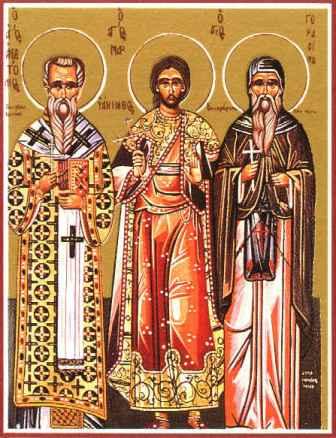 A young man, a courtier at the court of the Emperor Trajan, he was a secret Christian. Once, when the Emperor and all his court were offering sacrifice to idols, Hyacinthus stood apart from these abominable ceremonies. He was therefore denounced and brought to trial before the Emperor. The Emperor urged him to deny Christ and sacrifice to idols, but Hyacinthus remained firm as diamond and said to the Emperor: "I am a Christian. I revere Christ and worship Him, and I bring my living self to Him as a sacrifice." Whipped, spat upon and flayed, this holy martyr was flung into prison. By order of the Emperor, he was given nothing to eat but food that had been sacrificed to idols. Hyacinthus would not eat this, and died in prison after eight days. The warder saw two shining angels in the prison, one covering the martyr"s body with his own glorious vesture and the other placing a wreath of glory on his head; and the whole prison was filled with light and radiance. The young Hyacinthus suffered with honour and was crowned with a wreath of glory in the year 108. A young man, a courtier at the court of the Emperor Trajan, he was a secret Christian. Once, when the Emperor and all his court were offering sacrifice to idols, Hyacinthus stood apart from these abominable ceremonies. He was therefore denounced and brought to trial before the Emperor. The Emperor urged him to deny Christ and sacrifice to idols, but Hyacinthus remained firm as diamond and said to the Emperor: "I am a Christian. I revere Christ and worship Him, and I bring my living self to Him as a sacrifice." Whipped, spat upon and flayed, this holy martyr was flung into prison. By order of the Emperor, he was given nothing to eat but food that had been sacrificed to idols. Hyacinthus would not eat this, and died in prison after eight days. The warder saw two shining angels in the prison, one covering the martyr"s body with his own glorious vesture and the other placing a wreath of glory on his head; and the whole prison was filled with light and radiance. The young Hyacinthus suffered with honour and was crowned with a wreath of glory in the year 108.St Anatolius, Patriarch of Constantinople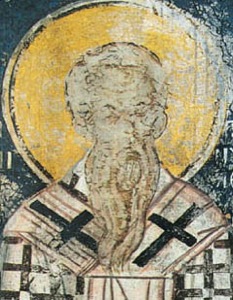 He was at first a priest in Alexandria, but, after the death of Patriarch Flavian in 449, he was elevated to the patriarchal throne in Constantinople. In his time, the throne of Constantinople was declared to be equal with that of Rome, at the Ecumenical Council in Chalcedon in 451. He strove mightily for the purity of the Orthodox faith, suffered much at the hands of heretics and was in the end killed by them in 458, in the reign of Leo the Great. He governed the Church for nearly nine years, and went to join the holy hierarchs in the Kingdom of God. He was at first a priest in Alexandria, but, after the death of Patriarch Flavian in 449, he was elevated to the patriarchal throne in Constantinople. In his time, the throne of Constantinople was declared to be equal with that of Rome, at the Ecumenical Council in Chalcedon in 451. He strove mightily for the purity of the Orthodox faith, suffered much at the hands of heretics and was in the end killed by them in 458, in the reign of Leo the Great. He governed the Church for nearly nine years, and went to join the holy hierarchs in the Kingdom of God.Our Holy Father Alexander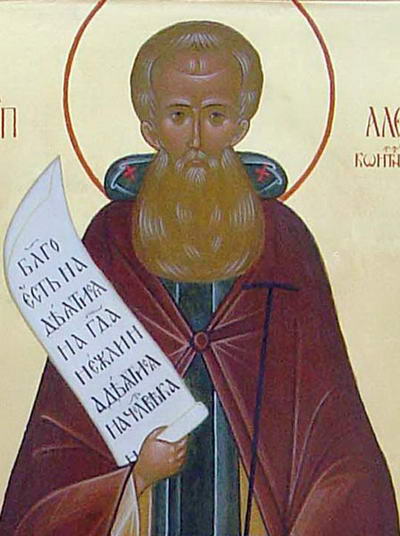 Born in Asia and educated in Constantinople, he went into the army after completing his studies and became an officer. Reading the Holy Scriptures, he came upon the Saviour"s words: "If thou wilt be perfect, go and sell all that thou hast, and give to the poor, and thou shalt have treasure in heaven; and come and follow Me" (Matt. 19:21).These words made such an impression on him that he sold and gave away all that he had, and went off to the desert. After long asceticism and striving for purification, he founded the community of the "Wakeful Ones" (Acoemetae) with a special rule. According to this rule, the services in the church continued day and night in unbroken sequence. The brethren were divided into six groups, each having its appointed hours of day or night to go to church and take over the reading and singing from the previous group. He travelled a great deal all over the East, bringing people to faith in Christ, disputing with heretics, working miracles by God"s grace and growing old in the service of the Lord Jesus. He finished his earthly course in Constantinople in the year 430, where his relics revealed the miraculous power and glory with which God had glorified His holy servant. Born in Asia and educated in Constantinople, he went into the army after completing his studies and became an officer. Reading the Holy Scriptures, he came upon the Saviour"s words: "If thou wilt be perfect, go and sell all that thou hast, and give to the poor, and thou shalt have treasure in heaven; and come and follow Me" (Matt. 19:21).These words made such an impression on him that he sold and gave away all that he had, and went off to the desert. After long asceticism and striving for purification, he founded the community of the "Wakeful Ones" (Acoemetae) with a special rule. According to this rule, the services in the church continued day and night in unbroken sequence. The brethren were divided into six groups, each having its appointed hours of day or night to go to church and take over the reading and singing from the previous group. He travelled a great deal all over the East, bringing people to faith in Christ, disputing with heretics, working miracles by God"s grace and growing old in the service of the Lord Jesus. He finished his earthly course in Constantinople in the year 430, where his relics revealed the miraculous power and glory with which God had glorified His holy servant.Our Holy Father Isaiah the Solitary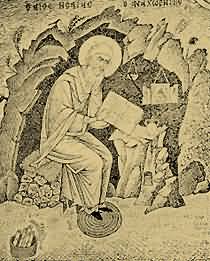 He lived in asceticism at Scetis in Egypt and then in Palestine, dying in Gaza in about 491. He is mentioned in Barsanuphius and John"s book as a man of outstanding holiness (Answers: 240, 252, 311 etc.). He wrote much that was instructive for monks and solitaries, but few of his writings are extant, the majority having been destroyed by Moslems. St Isaiah said: "The mind, before it awakens from the sleep of laziness, is with the demons." "The crown of all good works consists in this: that a man place all his hope in God, that he flee to Him once and for all with all his heart and strength, that he be filled with compassion for all and weep before God, imploring His help and mercy." What is the sign that a man"s sin is forgiven? "The sign that a sin is forgiven is that the sin has no further action in your heart, and that you have so utterly forgotten it that, in speaking of such a sin, you feel no inclination to it but regard it as something totally outside you. That is the sign that you are forgiven." Prayer and asceticism are useless to a man who conceals within himself malice towards his neighbour and the desire for revenge. "Watch with all your strength that your mouth does not speak one thing and your heart contain something quite different." "The crown of good works is love; the crown of the passions is the justifying of one"s sins. He lived in asceticism at Scetis in Egypt and then in Palestine, dying in Gaza in about 491. He is mentioned in Barsanuphius and John"s book as a man of outstanding holiness (Answers: 240, 252, 311 etc.). He wrote much that was instructive for monks and solitaries, but few of his writings are extant, the majority having been destroyed by Moslems. St Isaiah said: "The mind, before it awakens from the sleep of laziness, is with the demons." "The crown of all good works consists in this: that a man place all his hope in God, that he flee to Him once and for all with all his heart and strength, that he be filled with compassion for all and weep before God, imploring His help and mercy." What is the sign that a man"s sin is forgiven? "The sign that a sin is forgiven is that the sin has no further action in your heart, and that you have so utterly forgotten it that, in speaking of such a sin, you feel no inclination to it but regard it as something totally outside you. That is the sign that you are forgiven." Prayer and asceticism are useless to a man who conceals within himself malice towards his neighbour and the desire for revenge. "Watch with all your strength that your mouth does not speak one thing and your heart contain something quite different." "The crown of good works is love; the crown of the passions is the justifying of one"s sins.Martyrs Mocius (Mucian) and Mark (4th c.)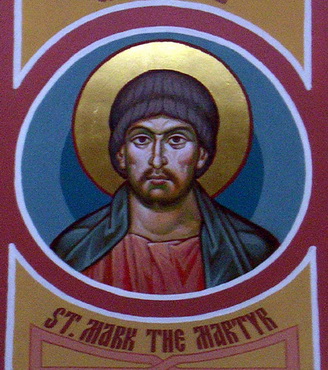 The Holy Martyrs Mokios and Mark were arrested as Christians and brought to trial by the governor Maximian. They refused to offer sacrifice to idols, for which they suffered death by beheading by the sword (IV Century). The Holy Martyrs Mokios and Mark were arrested as Christians and brought to trial by the governor Maximian. They refused to offer sacrifice to idols, for which they suffered death by beheading by the sword (IV Century).Icon of the Mother of God the “Milk-Giver” of the Hilandar Monastery on Mt. Athos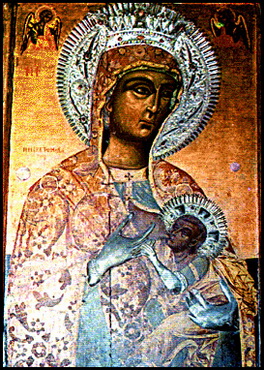 The “Milk-Giver” Icon of the Mother of God was originally located at the Lavra of St Sava the Sanctified near Jerusalem. Before his death, the holy founder of the Lavra foretold that a royal pilgrim having the same name as himself would visit the Lavra. St Sava told the brethren to give the wonderworking icon to that pilgrim as a blessing... The “Milk-Giver” Icon of the Mother of God was originally located at the Lavra of St Sava the Sanctified near Jerusalem. Before his death, the holy founder of the Lavra foretold that a royal pilgrim having the same name as himself would visit the Lavra. St Sava told the brethren to give the wonderworking icon to that pilgrim as a blessing...Venerable Gerasimus the New of Carpenision (1812)Holy Princes Basil (1249) and Constantine (1257) of Yaroslavl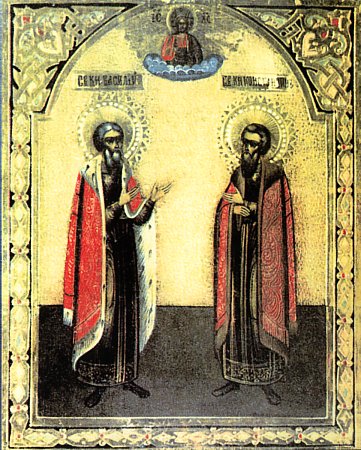 The Repose of Nobleborn Princes Vasilii and Konstantin Vsevolodovich of Yaroslavsk: In their youth they lost their father, Vsevolod, who fell in battle with the Tatars (Mongols). Saint Vasilii, the elder brother, succeeded to the throne. A multitude of concerns, tasks and sorrows beset him as prince. The city and the villages were devastated from the invasion of the Tatars, many households remained without shelter and food, and he had to concern himself about everything and about everyone. Besides this, it was necessary to gain the good-will of the Tatar khan, and the holy prince more than once made journey for this reason to the Horde. He suffered also a family misfortune – the loss of his only son... The Repose of Nobleborn Princes Vasilii and Konstantin Vsevolodovich of Yaroslavsk: In their youth they lost their father, Vsevolod, who fell in battle with the Tatars (Mongols). Saint Vasilii, the elder brother, succeeded to the throne. A multitude of concerns, tasks and sorrows beset him as prince. The city and the villages were devastated from the invasion of the Tatars, many households remained without shelter and food, and he had to concern himself about everything and about everyone. Besides this, it was necessary to gain the good-will of the Tatar khan, and the holy prince more than once made journey for this reason to the Horde. He suffered also a family misfortune – the loss of his only son...Venerables John and Longinus, wonderworkers of Yarenga (Solovki) (1544-45)Venerable Nicodemus, abbot of Kozha Lake (1640)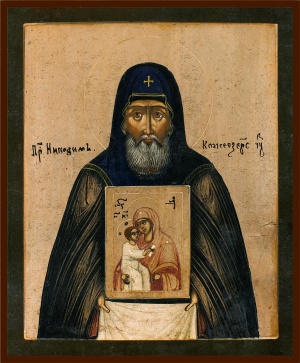 The Monk Nikodim of Kozheezersk, in the world Nikita, was born in the village of Ivan'kovo near Rostov into a peasant family. While still in his youth, working with his father in the fields, he heard the words: "Nikodim! Nikodim!" announcing his future monasticism. After the death of his parents he learned the blacksmith craft in Yaroslavl' and then arrived in Moscow. One time, going past Kulishka, Nikita stopped at the hut of the holy fool Ilia, who upon seeing him cried out: "the Khuz'yugsk ascetic hath arrived"... The Monk Nikodim of Kozheezersk, in the world Nikita, was born in the village of Ivan'kovo near Rostov into a peasant family. While still in his youth, working with his father in the fields, he heard the words: "Nikodim! Nikodim!" announcing his future monasticism. After the death of his parents he learned the blacksmith craft in Yaroslavl' and then arrived in Moscow. One time, going past Kulishka, Nikita stopped at the hut of the holy fool Ilia, who upon seeing him cried out: "the Khuz'yugsk ascetic hath arrived"...Blessed John of Moscow, fool-for-Christ (1589)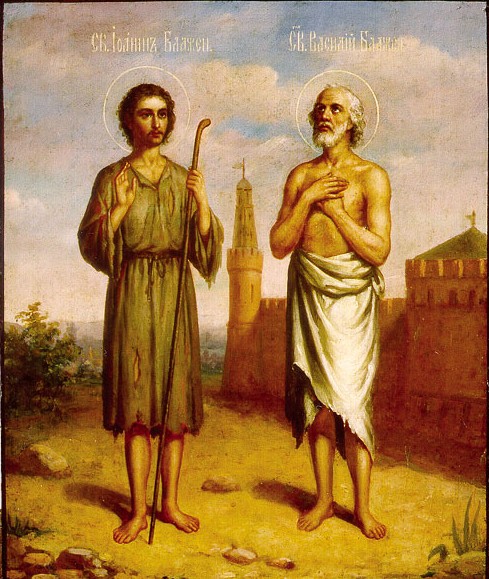 Blessed John, Fool-for-Christ, Moscow Wonderworker, was born in the Vologda outskirts. In his youth he toiled at a saltworks, where he was a "water-carrier". With his heavy work the saint combined strict fasting and prayer. Later he moved on to Rostov, where he began his exploit of holy fool. He wore chains with heavy iron crosses and on his head was an heavy iron cap, for which they called him "Ioann – Big-Cap". In Moscow he went barefoot and almost naked in even the most severe frost, and he foretold the great misfortunes for Russia, the Time of Troubles and the incursion of the Polish, saying, that "in Moscow will be many seen and unseen devils".
He fearlessly spoke the truth to everyone, regardless of the position they might occupy. Even to the tsar himself, Boris Godunov, he often said the words: "A clever mind, thou inquirest God's doing. God long waiteth, painfully indeed it breaketh". Before death Saint John indicated for himself a grave at the Pokrov church on Rva, afterwards called the cathedral of Basil/Vasilii the Great. Having readied himself for the grave, he removed the chains and thrice showered himself with water. Before his death (+ 1589) the blessed one displayed the gift of healing. He was venerated at Moscow as a great wonderworker and seer. On 12 June 1672 his relics were uncovered, resting beneathe a crypt in one of the chapels of the cathedral of Basil the Great. The service and vita-life were preserved in manuscripts of the XVII Century. Blessed John, Fool-for-Christ, Moscow Wonderworker, was born in the Vologda outskirts. In his youth he toiled at a saltworks, where he was a "water-carrier". With his heavy work the saint combined strict fasting and prayer. Later he moved on to Rostov, where he began his exploit of holy fool. He wore chains with heavy iron crosses and on his head was an heavy iron cap, for which they called him "Ioann – Big-Cap". In Moscow he went barefoot and almost naked in even the most severe frost, and he foretold the great misfortunes for Russia, the Time of Troubles and the incursion of the Polish, saying, that "in Moscow will be many seen and unseen devils".
He fearlessly spoke the truth to everyone, regardless of the position they might occupy. Even to the tsar himself, Boris Godunov, he often said the words: "A clever mind, thou inquirest God's doing. God long waiteth, painfully indeed it breaketh". Before death Saint John indicated for himself a grave at the Pokrov church on Rva, afterwards called the cathedral of Basil/Vasilii the Great. Having readied himself for the grave, he removed the chains and thrice showered himself with water. Before his death (+ 1589) the blessed one displayed the gift of healing. He was venerated at Moscow as a great wonderworker and seer. On 12 June 1672 his relics were uncovered, resting beneathe a crypt in one of the chapels of the cathedral of Basil the Great. The service and vita-life were preserved in manuscripts of the XVII Century.St George the God-Bearer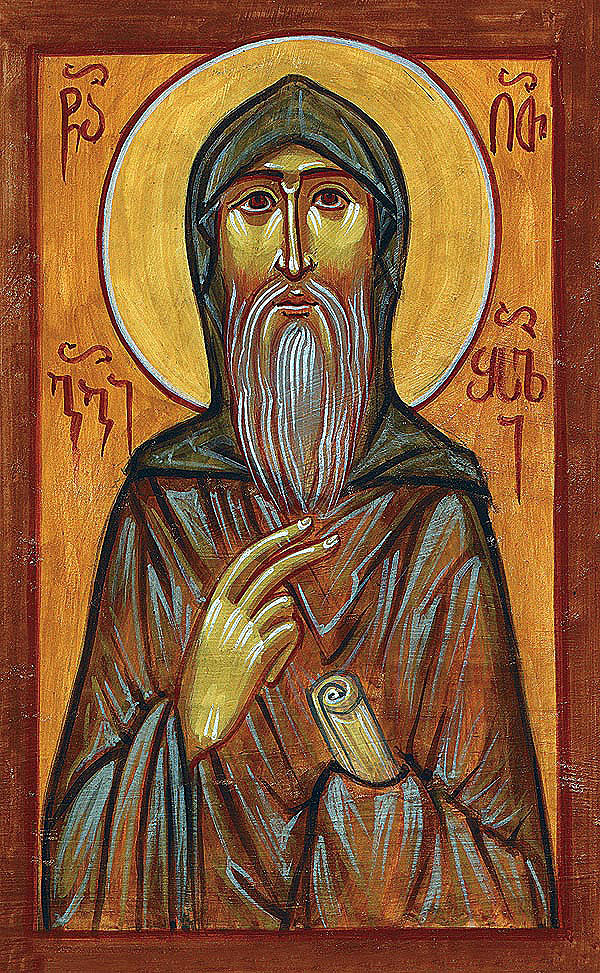 Saint George the God-bearer and Recluse labored in the Black Mountains near Antioch during a time when the churches and monasteries there flourished. Orthodox Christians from many parts of the world came to settle there, and as a result, tensions often arose between monks of different nationalities. In order to remain detached from the conflicts, Fr. George found refuge in an impregnable cleft of a very high mountain. For this reason he is also called St. George the Recluse... Saint George the God-bearer and Recluse labored in the Black Mountains near Antioch during a time when the churches and monasteries there flourished. Orthodox Christians from many parts of the world came to settle there, and as a result, tensions often arose between monks of different nationalities. In order to remain detached from the conflicts, Fr. George found refuge in an impregnable cleft of a very high mountain. For this reason he is also called St. George the Recluse... |